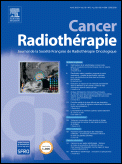
Cancer Radiotherapie
Scope & Guideline
Exploring new frontiers in radiotherapy to enhance cancer therapies.
Introduction
Aims and Scopes
- Clinical trials and observational studies:
The journal publishes results from clinical trials and observational studies that assess the efficacy and safety of radiotherapy treatments across different cancer types. - Technological advancements in radiotherapy:
It emphasizes research on new technologies, such as artificial intelligence and deep learning, that enhance precision in radiotherapy and improve treatment planning. - Multidisciplinary approaches:
The journal encourages a multidisciplinary perspective, integrating insights from oncology, radiology, surgery, and other fields to optimize cancer treatment. - Patient-centered outcomes:
Research focusing on patient quality of life, treatment tolerability, and long-term effects of radiotherapy is a significant area of interest. - Emerging treatment modalities:
The journal explores novel treatment approaches, including hypofractionated schedules, stereotactic body radiotherapy, and combination therapies with immunotherapy. - Ethical and practical considerations:
It also addresses ethical issues in radiotherapy practice, including informed consent and risk management.
Trending and Emerging
- Artificial intelligence in radiotherapy:
There is a growing trend in the application of artificial intelligence for treatment planning and dose optimization, indicating a move towards personalized medicine. - Integrative treatment approaches:
The combination of radiotherapy with immunotherapy and targeted therapies is gaining traction, highlighting the importance of multidisciplinary strategies in cancer management. - Hypofractionated and stereotactic therapies:
Research into hypofractionated regimens and stereotactic body radiation therapy is on the rise, reflecting a shift towards more effective treatment protocols. - Radiomics and predictive modeling:
Emerging studies focusing on radiomics and the use of predictive modeling to anticipate treatment responses and outcomes are increasingly prevalent. - Quality of life and survivorship studies:
There is an increasing emphasis on understanding the quality of life and long-term survivorship issues related to cancer treatment, integrating patient-reported outcomes into research. - Ethics and patient engagement:
Discussions around ethical considerations in radiotherapy and the importance of patient engagement in treatment decisions are becoming more prominent.
Declining or Waning
- Traditional fractionation schedules:
Research on conventional fractionation methods is declining as newer, more effective techniques like hypofractionation gain popularity. - Radiotherapy in rare tumor types:
Studies focusing on radiotherapy for rare cancers are less frequent, possibly due to a shift towards more common malignancies where larger patient populations can yield significant data. - Basic radiobiology and physics:
There is a noticeable decrease in papers dedicated solely to the fundamental principles of radiobiology and radiation physics, as the journal increasingly prioritizes clinical applications and outcomes. - Historical data analyses:
The number of publications analyzing historical data trends in radiotherapy is diminishing as the focus shifts towards contemporary clinical trials and real-time data. - Palliative care aspects of radiotherapy:
While still relevant, research specifically targeting palliative radiotherapy is less frequently highlighted in favor of curative treatment strategies.
Similar Journals
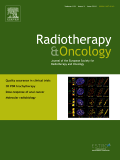
RADIOTHERAPY AND ONCOLOGY
Advancing cancer care through groundbreaking research.Radiotherapy and Oncology is a leading peer-reviewed journal published by Elsevier Ireland Ltd, focusing on the vital fields of hematology, oncology, and radiology. With an impressive impact factor and ranking in the top quartiles (Q1) of its categories as of 2023, it is recognized for disseminating high-quality research that contributes significantly to advancements in cancer treatment and patient care. The journal, which has been in circulation since 1983, aims to provide a platform for original research articles, reviews, and clinical studies that explore the latest innovations in radiotherapeutic technologies and oncology practices. This journal is essential for researchers, healthcare professionals, and students who are dedicated to improving cancer therapies and outcomes. Although it does not offer open access, the wealth of information contained within its pages supports continued education and development in these crucial medical fields.

Translational Oncology
Shaping the Future of Oncology Through DiscoveryTranslational Oncology is a premier open access journal published by Elsevier Science Inc, dedicated to the rapidly evolving field of cancer research and oncology. Since its inception in 2008, the journal has been a vital platform for the dissemination of innovative research and findings that bridge the gap between laboratory discoveries and clinical applications. With an impressive impact factor and ranked Q2 in Cancer Research and Q1 in Oncology, it occupies a prominent position in the academic landscape, helping to shape the future of cancer therapeutics and patient care. The journal offers valuable insights across a diverse array of topics, including molecular biology, genetic factors in cancer, and innovative treatment strategies, ensuring relevance and engagement for its readership. As it converges toward 2024, Translational Oncology continues to attract a global audience of researchers, healthcare professionals, and students committed to advancing our understanding of cancer and enhancing clinical outcomes.

Breast Cancer-Targets and Therapy
Exploring groundbreaking strategies in oncology.Breast Cancer-Targets and Therapy is a leading journal in the field of oncology, published by DOVE MEDICAL PRESS LTD in New Zealand. Established as an Open Access journal in 2009, it offers a platform for researchers and healthcare professionals to disseminate innovative findings and therapeutic strategies related to breast cancer. With an impressive ranking in the Q2 category of oncology journals as of 2023, and placed at Rank #203/404 in the Scopus database, this journal facilitates the exchange of high-quality research aimed at improving patient outcomes and advancing clinical practices. Covering a wide array of topics from basic research to clinical trials, Breast Cancer-Targets and Therapy plays a crucial role in bridging the gap between scientific discovery and practical application. Researchers, professionals, and students alike will find the journal a valuable resource for the latest advancements and best practices in breast cancer treatment.
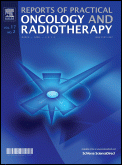
Reports of Practical Oncology and Radiotherapy
Championing transparency in cancer research dissemination.Reports of Practical Oncology and Radiotherapy is a distinguished open-access journal dedicated to advancing the fields of oncology, radiotherapy, and cancer research. Published by VIA MEDICA since 2001, this journal serves as a critical platform for disseminating innovative research and practical findings that impact clinical practices and patient outcomes. With an emphasis on fostering collaboration and knowledge exchange among researchers, clinicians, and students, the journal has positioned itself within the Q3 and Q4 categories of renowned directories in oncology, radiology, and nuclear medicine as of 2023. Based in Gdansk, Poland, it provides unrestricted access to its articles, ensuring that crucial research reaches a wide audience. This dedication to open access reflects the journal's commitment to transparency and innovation in the fight against cancer, making it an invaluable resource in this vital field of study.
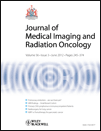
Journal of Medical Imaging and Radiation Oncology
Pioneering Discoveries in Cancer Treatment and ImagingJournal of Medical Imaging and Radiation Oncology, published by WILEY, is a pivotal resource in the fields of oncology and medical imaging. With an impact factor reflective of its commitment to advancing research, the journal has maintained a robust reputation since its inception in 2008 and continues to thrive through 2024. It is indexed with an insightful ranking, with a Q2 classification in Radiology, Nuclear Medicine and Imaging, affirming its importance in these disciplines. This journal not only serves as an open access platform, allowing extensive reach and accessibility, but also fosters a scholarly community dedicated to the innovation of imaging techniques and radiation oncology practices. As a key player in disseminating crucial findings and advancements, it appeals to researchers, clinicians, and students who aim to contribute to the evolving landscape of medical imaging and cancer treatment methodologies. The journal is based in Australia, at 111 River St, Hoboken, NJ, and invites submissions that push the boundaries of current knowledge in this critical area of healthcare.

International Journal of Clinical Oncology
Fostering Excellence in Hematology and OncologyInternational Journal of Clinical Oncology, published by SPRINGER JAPAN KK, is a leading peer-reviewed journal dedicated to advancing research and clinical practices in the fields of oncology, hematology, and surgery. With its impact factor reflecting its significance and reach in the academic community, this journal serves as a solid platform for researchers, professionals, and students to share and disseminate groundbreaking discoveries and methodologies. Notably, it has secured prestigious rankings in the Q1 category in Medicine (miscellaneous) and Surgery, and Q2 in Hematology and Oncology, illustrating its prominent position in the medical literature. The journal's comprehensive scope addresses pivotal clinical issues from 1996 through 2024, further solidifying its relevance in the ever-evolving landscape of cancer research. Despite not offering open access, the depth and quality of research articles ensure that vital information remains accessible to those committed to improving clinical outcomes in oncology. With a focus on innovative treatments and patient care, the International Journal of Clinical Oncology embodies a commitment to fostering excellence in medical research.
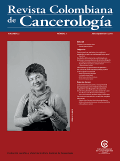
Revista Colombiana de Cancerologia
Your Gateway to the Latest in Cancer ResearchRevista Colombiana de Cancerologia is a premier journal dedicated to advancing the field of oncology in Colombia and beyond. Published by the Instituto Nacional de Cancerología, this journal serves as a vital platform for the dissemination of high-quality research, comprehensive reviews, and innovative methodologies pertinent to cancer research and treatment. With an ISSN of 0123-9015 and E-ISSN 2346-0199, it aims to engage a diverse audience, including researchers, healthcare professionals, and students, fostering collaboration and knowledge sharing within the oncology community. Although specific metrics such as impact factors and H-index are currently unavailable, the journal is committed to maintaining high academic standards and encouraging open access to vital oncological insights. The Revista Colombiana de Cancerologia is positioned as an essential resource for those interested in the latest advancements in cancer care, prevention, and research methodologies, making significant contributions to the understanding and management of cancer.

Cancer Management and Research
Advancing oncology through innovative research.Cancer Management and Research, published by DOVE MEDICAL PRESS LTD, is a leading open-access journal dedicated to advancing the field of oncology. Since its inception in 2009, this journal has established itself as a vital resource for researchers, clinicians, and healthcare professionals focused on cancer treatment and management. With its robust impact factor and impressive Scopus ranking in the 77th percentile of oncology medicine, it provides a prominent platform for sharing high-quality research. The journal covers a wide range of topics within cancer management, including innovative therapeutic strategies, clinical trials, patient care, and health policy, ensuring a comprehensive approach to current challenges in the field. Operating from New Zealand, it invites contributions that can shape the future of oncology and improve patient outcomes globally, making it an essential addition to the libraries of those engaged in cancer research and practice.

STRAHLENTHERAPIE UND ONKOLOGIE
Transforming patient outcomes with rigorous research.STRAHLENTHERAPIE UND ONKOLOGIE is an esteemed journal published by Springer Heidelberg, focusing on critical advancements and research in the fields of Oncology and Radiology. Established in 1986, this journal has carved its niche within the scientific community, ranking in the Q1 category for Radiology, Nuclear Medicine and Imaging, and Q2 for Oncology as of 2023. With an ISSN of 0179-7158 and E-ISSN 1439-099X, it serves as an essential resource for researchers, professionals, and students dedicated to the complexities of cancer treatment and radiation therapy. While the journal operates under a subscription model, its broad international readership values its rigorous peer-review process and comprehensive coverage of pivotal studies. STRAHLENTHERAPIE UND ONKOLOGIE continues to enhance its impact in the domains of oncology and radiology, as evidenced by its commendable Scopus rankings, including a 76th percentile in Radiology and a 65th percentile in Oncology. Its commitment to disseminating innovative research solidifies its role as a cornerstone in the ongoing quest to improve patient care and therapeutic techniques.
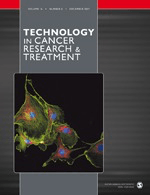
TECHNOLOGY IN CANCER RESEARCH & TREATMENT
Bridging technology and oncology for superior patient outcomes.TECHNOLOGY IN CANCER RESEARCH & TREATMENT, published by SAGE Publications Inc, is a leading open-access journal dedicated to the intersection of technology and oncology. Since its inception in 2002 and with an impactful transition to open access in 2018, it has garnered attention for its commitment to disseminating groundbreaking research that explores innovative methodologies and technologies in cancer diagnostics and therapeutics. With ISSN 1533-0346 and E-ISSN 1533-0338, the journal is highly relevant in the fields of Cancer Research (Q3), Medicine (Q2), and Oncology (Q3), as indicated by its 2023 category quartiles. Its Scopus rankings further highlight its position within the research community, standing at #186 out of 404 in Medicine and #141 out of 230 in Cancer Research. Through a carefully curated selection of articles, this journal aims to bridge the gap between technological advancement and clinical application, providing a vital resource for researchers, healthcare professionals, and students striving to improve cancer treatment outcomes.